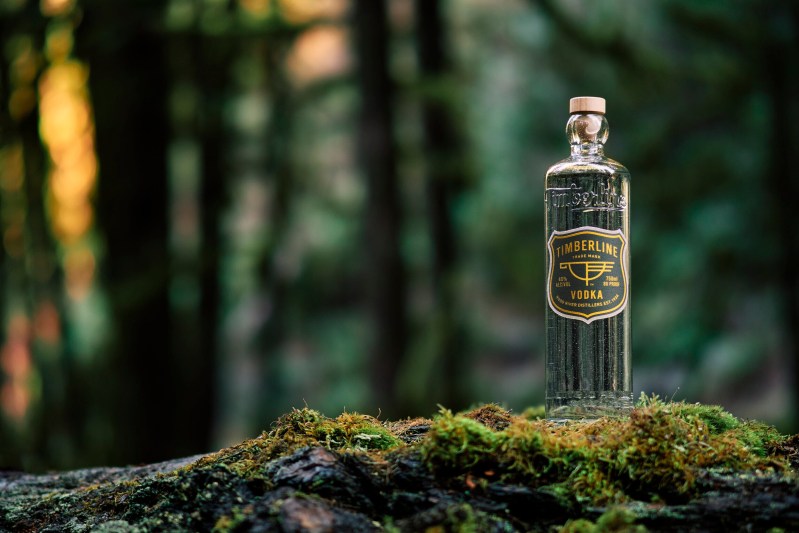
Indebted to the beautiful landscape its stationed in, Hood River Distillers is giving back to the environment. Through a new partnership with Timberline Lodge and The Freshwater Trust, Oregon’s oldest distillery is supporting important work that looks after the health of watersheds throughout the region.
The collaboration has quite literally been bottled. The distillery just released a special batch of vodka, which sports a custom label honoring iconic Pacific Northwest lodge (you know, the building from The Shining) Timberline Lodge. Meticulous distillation and purification processes led to an incredibly clean vodka, much like the many rivers, lakes, and streams in and around Hood River. As a nod to the outdoors, Hood River Distillers (HRD) released three different riffs on the Timberline Vodka label, dubbed The Hiker, The Skier, and The Snowgoose.
Related Reading
- Brands Giving Back: Geodesy Wines
- Brands Giving Back: Eunice Chiweshe Goldstein Winery
- The 8 Best Top-Shelf Vodka Brands
Meet the Team

Water is a big deal, especially if what you specialize in is primarily H20. “Water is a crucial part of a spirit’s flavor, and we are grateful to have amazing, quality water so close to our distillery,” says HRD Senior Brand Manager Keri Meuret. “Using non-quality water can ruin a well-made spirit, especially a spirit as neutral as vodka. It is one of the most important ingredients in our products.”
Meuret says the family-owned distillery’s roots are deep, and that it’s imperative to align with like-minded companies. Hence, the partnership with The Freshwater Trust, something she calls a “natural fit.” The Trust, based in nearby Portland, is an esteemed organization that leverages extensive research and science to protect and restore freshwater habitats in the American West. “It is not only important for us to let our customers know the ways in which we respect the environment in the Pacific Northwest, but it’s just the right thing to do,” Meuret adds.
Back when Hood River Distillers got started, Franklin D. Roosevelt was president and Benny Goodman’s “Moon Glow” was the pop song de jour. The brand began in 1934, in the wake of the Great Depression, taking advantage of the copious amounts of excess fruit available right in its backyard. Hood River, located in the breathtaking Columbia River Gorge about an hour east of Portland, has long been a hotbed for apple and pear orchards. Hood River Distillers got its start turning the leftovers from heavy fruit yields into brandies and fruit wines. In fact, it was the first American outfit to receive a distilled spirits plant license.
Timberline Vodka pays homage to the agricultural ways of the Hood River area. It is made with 14 different apple varietals, all grown locally. Meuret says the formal connection with the lodge is a couple of years in the making. She says there are many synergies between the two companies, both launched around the same time in the mid-1930s and family-run (or family-operated, as Timberline is).
Hood River Distillers Environmental Advocacy

Companies support noble organizations all the time, both to present well and for the write-off. This collaboration was the result of more thought and deliberation, Meuret says, the byproduct of long conversations among executive and senior teams at the distillery. HRD put in some extra work to find a partnership that is more authentic — one that’s grounded very much in local environmental support. It seems like the work of a company that matches its employees’ contributions to charitable organizations.
As part of the partnership, HRD will donate annually (“a generous annual contribution,” Meuret says) to the Trust and support its efforts through its various media avenues. It’s not the first time HRD has given back. In 2018, the company donated to the National Forest Foundation’s Trees for US program through its Trails End Kentucky Straight Bourbon Whiskey. That particular spirit was finished in Oregon oak barrels, so supporting efforts to reforest the region made a lot of sense. Additionally, it aligned with the brand’s clear love of the outdoors, not to mention that it offered a bit of relief after some devastating fires that year (some, right down the river).
“Our company places a high value on giving back, and for decades, Hood River Distillers has supported philanthropic efforts environmentally and otherwise,” Meuret says.
How You Can Support

If you’re in the Portland area Hood River Distillers is just a little over an hour away. And if you know someone who lives in Portland you can purchase e-giftcards.


